

Boys can play with dolls as much as girls can play with toy trucks. Feminine Traits & Stereotypes. Our society has a set of ideas about how we expect men and women to dress, behave, and present themselves.

What are gender roles? Gender roles in society means how we’re expected to act, speak, dress, groom, and conduct ourselves based upon our assigned sex. For example, girls and women are generally expected to dress in typically feminine ways and be polite, accommodating, and nurturing. Men are generally expected to be strong, aggressive, and bold. (10) Gender Roles and Stereotypes. Gender stereotypes and education. The Multiple Dimensions of Gender Stereotypes: A Current Look at Men’s and Women’s Characterizations of Others and Themselves. Introduction There is no question that a great deal of progress has been made toward gender equality, and this progress is particularly evident in the workplace.

There also is no question that the goal of full gender equality has not yet been achieved – not in pay (AAUW, 2016) or position level (Catalyst, 2016). In a recent interview study with female managers the majority of barriers for women’s advancement that were identified were consequences of gender stereotypes (Peus et al., 2015). There is a long history of research in psychology that corroborates this finding (for reviews see Eagly and Sczesny, 2009; Heilman, 2012). These investigations support the idea that gender stereotypes can be impediments to women’s career advancement, promoting both gender bias in employment decisions and women’s self-limiting behavior (Heilman, 1983). Gender Roles in Society. Gender constancy theory. Gender constancy. Untitled. The Role of Gender Constancy in Early Gender Development on JSTOR. Wiley is a global provider of content and content-enabled workflow solutions in areas of scientific, technical, medical, and scholarly research; professional development; and education.

Our core businesses produce scientific, technical, medical, and scholarly journals, reference works, books, database services, and advertising; professional books, subscription products, certification and training services and online applications; and education content and services including integrated online teaching and learning resources for undergraduate and graduate students and lifelong learners. Founded in 1807, John Wiley & Sons, Inc. has been a valued source of information and understanding for more than 200 years, helping people around the world meet their needs and fulfill their aspirations. Wiley has published the works of more than 450 Nobel laureates in all categories: Literature, Economics, Physiology or Medicine, Physics, Chemistry, and Peace. An Overview of Gender Constancy. In its simplest terms, gender constancy refers to the theory that children develop a sense of gender over time and eventually come to understand that their biological sex is fixed and permanent.
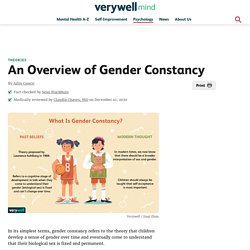
This theory is over 50 years old and originates from the work of American psychologist Lawrence Kohlberg. As simple as the theory sounds, however, it's not a simple concept in the least—which is why research on gender development has continued to this day. It's also true that the theory of gender constancy was developed at a different time in history, and doesn't reflect current social norms as far as what is acceptable or what children should be taught as they grow and learn.
For example, the theory does not account for individuals who identify as transgender, nonbinary, or gender fluid. Definition of Gender Constancy. Parental socialization of sadness regulation in middle childhood: the role of expectations and gender. The authors of this study investigated mothers' and fathers' socialization of their children's sadness.

The particular focus was an examination of how socialization practices changed when parents' expectancies concerning their child's sadness management abilities were violated. Methods included an experimental manipulation and direct observation of parent-child interactions in 62 families of White, middle-class children in 3rd and 4th grades. Cognitive and Social Learning Theories of Gender Role Formation. Gender: early socialization: Parents' socialization. Introduction When parents have a new baby, the first question they typically ask is whether they have a girl or a boy.
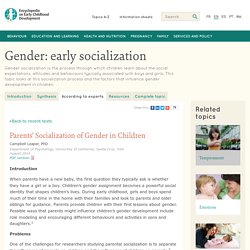
Children’s gender assignment becomes a powerful social identity that shapes children’s lives. During early childhood, girls and boys spend much of their time in the home with their families and look to parents and older siblings for guidance. Parents provide children with their first lessons about gender. Possible ways that parents might influence children’s gender development include role modeling and encouraging different behaviours and activities in sons and daughters.1. How Albert Bandura's Social Learning Theory Works. Learning is a remarkably complex process that is influenced by a wide variety of factors. As most parents are probably very much aware, observation can play a critical role in determining how and what children learn.1 As the saying goes, kids are very much like sponges, soaking up the experiences they have each and every day.
Because learning is so complex, there are many different psychological theories to explain how and why people learn. APA PsycNet. How Parents Influence Kids' Gender Roles. Parents socialization of gender in children. Parental influence on children's socialization to gender roles. The importance of gender roles and reducing of stereotypes. 5 ways parents can help kids avoid gender stereotypes. In the last century, significant progress has been made in advancing gender equity in the United States.
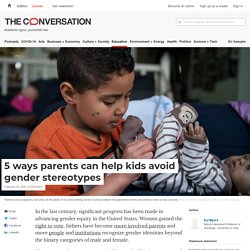
Women gained the right to vote, fathers have become more involved parents and more people and institutions recognize gender identities beyond the binary categories of male and female. However, persistent gaps remain. Women hold only a quarter of U.S. congressional seats, only a handful of states mandate paid paternity leave and state legislatures are introducing bills that discriminate against transgender people. The majority of Americans believe there is more work to do on gender equality. As a genderqueer sociologist, a parent of a kindergartner and the author of a book on gender creative parenting, I study the importance of disrupting sexism in childhood. The Importance of a Child's Social Identity. Childhood is an important period of social development, particularly in the formation of social identity, or a person's sense of who they are based upon group affiliations.
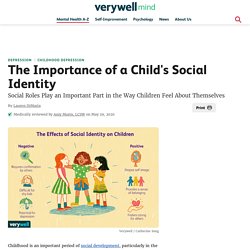
For some children, the way they feel about themselves and their social identities may contribute to their vulnerability to depression. Depression is a complex condition influenced by a range of factors, but there is evidence that social factors can play a critical role. What Is Social Identity? Every child has a social identity, which is how we perceive our various roles in society in relation to others. Children and gender identity: Supporting your child. Children and gender identity: Supporting your child Understand the importance of talking with your child about gender identity and expression — and how to get the conversation started.
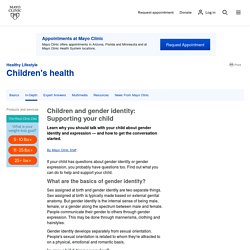
By Mayo Clinic Staff If your child has questions about gender identity or gender expression, you've probably got questions, too. Understanding Gender Roles And What Parents Can Do - Beech Acres. Understanding Gender Roles Have you ever really considered why the toy aisles at your favorite department store are divided into “boys” and “girls” sections?

What makes a toy a “boys” or a “girls” toy? If you’re like many parents you may find your daughter wearing a Spider-Man shirt and shopping for Star Wars figures and your son feeling empowered by strong Disney Princesses like Elsa or Moana. What if your son’s baseball team chooses pink jerseys or your daughter wants to compete against boys in athletics or academics? Understanding and discussing gender can be as complex as exploring gender identity or as simple as “blue” versus “pink”.